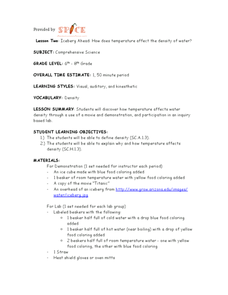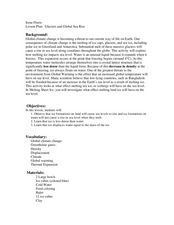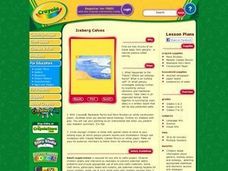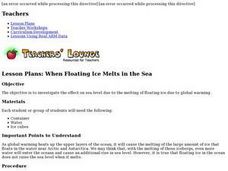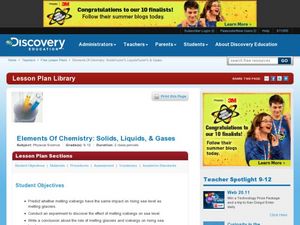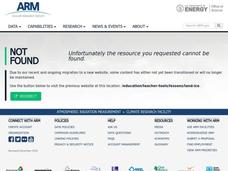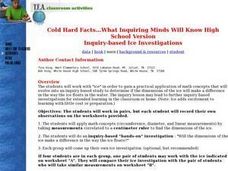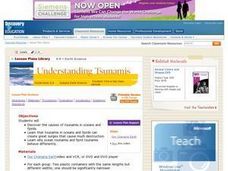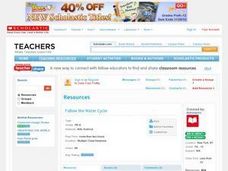Curated OER
Glaciers and Icebergs
Students conduct an experiment on glacial scraping. In this glacial scraping lesson, students create a small glacier in a plastic cup. Students remove the cup and scrape the glacier across wood and note the markings. Students then make...
Curated OER
Iceberg Ahead: How Does Temperature Affect the Density of Water?
Demonstrate how ice floats on water and get the class thinking about why icebergs are so deceiving. Investigators then experiment with mixing water of the same temperature and water of different temperatures. Make sure to explain the...
Global Oneness Project
Witnessing Icebergs
Camille Seaman's photoessay, "Witnessing Icebergs" documents just a tip of the problem of climate change through images of icebergs in both the Arctic and Antarctic polar regions. After viewing the haunting images, viewers respond to a...
Curated OER
Antarctica: Effects of Salinity on Icebergs
Students investigate the effects of salinity on icebergs. In this hands on lesson, students design and conduct an investigation into how the amount of salt in ice affects its buoyancy.
Curated OER
Glaciers and Global Sea Rise
Students explain how melting glaciers affect global warming. In this earth science lesson plan, students investigate the change in ice density as it melts. They discuss the human and environmental impact of rising sea levels.
Curated OER
Art: Iceberg Calves
Students in small groups, research icebergs, including where they are located and the sinking of the Titanic. In addition, they discover the process of calving. Then, using construction paper and paints, students draw and color pictures...
Curated OER
Icebergs Ahead!
Students examine icebergs and how they are suspended in water, why ice floats, the melting process of an iceberg, and the floating behavior of ice compared to that of a cork through a lab activity.
Curated OER
When Floating Ice Melts in the Sea
With this simple inquiry exercise young scientists observe the effects of melting ice on water level. Set up an easy experiment with floating ice cubes in a dish of water then have your pupils make and record their observations of the...
Curated OER
How to Make a Lake
Students examine the Michigan state quarter and discuss the effects glaciers have on land formation. They perform an investigate using ice cubes and sand to show how glaciers have carved the land.
Curated OER
Icebergs Ahead!
Students experiment with density of ice, and examine how density affects how icebergs float in water.
Curated OER
The Tip of the Iceberg
Students discover the percentage of an iceberg that is above and below the water surface. They compare salt water icebergs and fresh water icebergs and if they behave the same of differently. They work with their lab group to perform...
Curated OER
Sea Water Freeze
Middle schoolers observe how salinity affects the time it takes water to freeze. They participate in an experiment to determine that ice is essentially salt-free whether formed from fresh or salt water
Curated OER
Elements of Chemistry: Solids, Liquids and Gases
Students predict if icebergs melting has an effect on the sea level rising. In this global warming lesson students complete an experiment to see the effects of melting icebergs and write a conclusion on their data collected.
Curated OER
When Land Ice Melts
The Artctic and Antarctic Ice caps are the focus of this Earth science lesson. In reality, this is more of a demonstration than a lesson, but there is some rich discussion that happens before, during, and after the demonstration takes...
Curated OER
Elements In Chemistry: Solids, Liquids and Gases
Students investigate the kinetic-molecular theory. In this state of matter lesson, students consider the differences of melting glaciers, melting icebergs and investigate on what happens when submerged water melts.
Curated OER
Mystery of the Megaflood
Students will use everyday items and speeds to describe the dimensions of a massive flood that occurred in the Pacific Northwest near the end of the last ice age.
Curated OER
Cold Hard Facts...What Inquiring Minds Will Know
Learners work with "ice" in order to gain a practical application of math concepts that evolve into an inquiry-based study. They determine if the dimensions of the ice make a difference in the way the ice floats in the water.
Curated OER
Understanding Tsunamis
Students discover the causes of tsunamis in oceans and fjords. They perform an experiment to discover how calving icebergs can create different wave patterns in the ocean and in a fjord. In addition, they draw a diagram to illustrate the...
Curated OER
Edible Glacier
Students complete a KWL chart on what they know about glaciers. Then they gather together around a table containing Jello and Cool Whip cookie mixture and are introduced to the parts of a glacier by observing this model.
Curated OER
When Land Ice Melts
Students investigate what happens when land ice melts. They discuss how the melting of land ice is different than the melting of icebergs. Students observe what happens as the ice melts.
Curated OER
A SALT WATER-Y WORLD
Students observe a model of the distribution of the earth's water and compare the relative volumes and percentages of types of water on earth.
Curated OER
Follow the Water Cycle
Students explore the stages in the water cycle, evaporation, condensation, and precipitation. They hypothesize about the source of rain and search for forms of water on Earth.
Curated OER
Landforms in a Tub
Fifth graders use common household items to build landforms and simulate weathering and erosion.
Curated OER
Water Pollution Prevention and Conservation
Students examine how to conserve water. They also discover how to prevent water pollution. They examine the Earth's water distribution as well.



